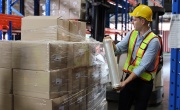Green Alliance report urges Government to adopt multiple metrics to tackle consumption
Environmental think tank recommends a suite of indicators, including material footprint, to direct comprehensive policy change for reducing the UK's environmental impact.
 A new report from Green Alliance is calling on the UK government to adopt a range of metrics to address the country's unsustainable resource consumption. The report, "Measuring up: The potential of targets to reduce resource use", examines five key metrics and recommends actions to curb the environmental impact of the UK's resource use.
A new report from Green Alliance is calling on the UK government to adopt a range of metrics to address the country's unsustainable resource consumption. The report, "Measuring up: The potential of targets to reduce resource use", examines five key metrics and recommends actions to curb the environmental impact of the UK's resource use.
The report advocates for a multi-pronged approach, focusing on material footprint, resource productivity, ecological footprint, the Global Environmental Impacts of Consumption (GEIC) indicator set, and consumption emissions. Each metric offers unique insights into the UK's resource use and its global impacts.
Green Alliance recommends setting an overall resource reduction target to more than halve the UK's material footprint, bringing within a sustainable range, estimated at between three to eight tonnes per person per year. According to recent figures, the UK's material footprint jumped from 13.9 tonnes per person in 2020 to 16.5 tonnes per person in 2021, which is more than twice the sustainable range.
Equally important, the report emphasises the need for more detailed data to guide policy interventions. It recommends prioritising the development of the GEIC indicator tool to complement existing datasets. The GEIC, developed by the Joint Nature Conservation Committee and the Stockholm Environment Institute, measures changes in ecosystem stock and condition, evaluating factors such as biodiversity loss, water impacts, and deforestation associated with a country's consumption.
Libby Peake, Head of Resources at Green Alliance and one of the authors of the report said: "The public want to see an economy where we make the most out of resources, and this is desperately needed to meet our legally-binding climate and nature commitments. But the reality today is that waste is hardwired into every part of the economy. The UK’s material footprint jumped in the latest figures and is now more than double what the science says is sustainable. A target to more than halve the UK’s material footprint is needed to focus minds."
The report also highlights the importance of tracking consumption emissions, shedding light on the issue of offshoring. While the UK's territorial emissions have fallen by 52 per cent since 1990, consumption emissions have only decreased by 36 per cent in the same period. This discrepancy reveals that a significant portion of emissions associated with UK consumption has been effectively offshored, occurring in other countries that produce goods and services for UK consumers.
Recognising that some materials and sectors have disproportionate environmental impacts, the report suggests setting specific targets for resources with higher environmental impacts per tonne and establishing targets for critical raw materials (CRMs) to ensure they remain in circulation. It also recommends focusing on high-impact sectors such as construction, furniture, electronics, textiles, packaging, and food and drink.
The report highlights the global urgency of addressing resource use, citing UN warnings that extraction and processing of materials is now driving 90 per cent of biodiversity loss and 55 per cent of global emissions. It emphasises that "throwaway living" in high-income countries like the UK is not only damaging environments and communities abroad but also limiting opportunities for green growth and economic resilience at home.
Green Alliance argues that the UK government has been too slow to act on its ambitions without concrete targets to drive progress. It suggests that adopting these recommendations, particularly setting legally binding targets across multiple metrics, would position the UK as a global leader in sustainable resource management.
The report notes that better resource use is essential for the green growth and economic resilience the UK aims to achieve. As a resource-poor but high-demand country heavily reliant on imports, the UK is exposed to volatile international supply chains. The report cites research suggesting that the impact of nature's degradation in UK supply chains could wipe six per cent off UK GDP by 2030 – a greater impact than the global financial crisis of 2007-08.





